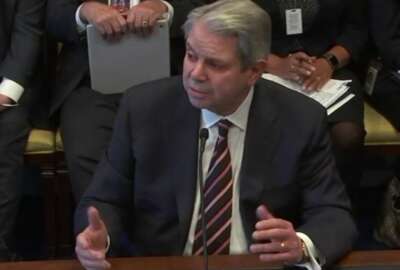

Congress killed off the Office of Technology Assessment in the mid-90s, but members of the House Appropriations Committee have taken the first step toward bringing...
Congress killed off the Office of Technology Assessment in the mid-90s, but members of the House Appropriations Committee have taken the first step toward bringing it back.
The committee, in a draft of the fiscal 2020 legislative branch spending bill, looks to give the watchdog office a $6 million budget to resume operations. Over the past few months, think tanks and lawmakers have voiced their support for a revived OTA.
Earlier this month, Rep. Mark Takano (D-Calif.) told the House Appropriations legislative branch subcommittee that defunding OTA had stripped Congress of a “valuable resource,” while Rep. Sean Casten (D-Ill.) said its absence made the U.S. “dumber as a nation.”
Since its creation in January, the Select Committee on the Modernization of Congress has looked at whether a modern-day OTA would help provide better tech expertise to lawmakers. One of its members, Rep. Bill Foster (D-Ill.), tweeted that a restored OTA would “give Congress the ability [to] receive non-partisan policy recommendations on tech issues.”
While $6 million may seem small in the context of the $35 million budget OTA received at the peak of its operations, it exceeds the $2.5 million lawmakers sought for OTA in an FY 2019 spending bill that Congress failed to pass.
“Six million [dollars] is above the level needed for a minimum viable product. It’s a good amount to get things started with,” Zach Graves, the head of policy at the Lincoln Network, said in an interview Tuesday.
If funded, Graves said OTA would likely spend its first year staffing up and updating procedures and processes that have gone untouched for more than two decades.
“The 90s were a very different context than today, in terms of how Congress functions and what issues it cares about. You’re going from a model that was largely pen and paper to a very digital era, and so you’re going to have to update some of these things,” Graves said.
Daniel Schuman, the policy director of Demand Progress, and a former legislative attorney at the Congressional Research Service, said OTA could play a significant role in analyzing the potential impact of long-term issues like biotechnology and climate change.
“Where do you invest the right type of money to deal with the changing nature of our world — this is always what OTA has done, trying to figure out how do you make sense of a very complex world,” Schuman said.
Sasha Moss, senior director at Insight Public Affairs and former government affairs manager for the R Street Institute, where she advocated for a revived OTA, said the release of the bill Tuesday marked a small step in the right direction, adding that it is “definitive proof Congress is finally acknowledging its lack of in-house technological expertise.”
The draft bill also sets a $616 million budget for the Government Accountability Office, a $26 million increase from enacted levels. GAO had requested a $58 million increase for its fiscal 2020 budget – an increase of nearly 10 percent.
That increase in funding will go toward staffing up GAO’s science and technology expertise. By the end of this year, the watchdog office will grow its information technology and cybersecurity team from 140 employees to 175, and looks to staff up its newer Science, Technology, Assessment and Analytics Team from 70 employees to 140 employees.
While GAO has signaled its willingness to fill some of the gaps left in the absence of OTA, Graves said both offices can oversee these issues without overlap. Whereas GAO will handle more of an oversight role, OTA will play more of a “foresight” function – spending up to a year-and-a-half on peer-reviewed reports.
“A technology assessment function is primarily designed to serve congressional committees as they’re thinking through your sort of major legacy legislative projects,” Graves said, pointing to the Department of Veterans Affairs’ ongoing, multi-billion dollar effort to migrate to the same electronic health record system as the Defense Department as a prime subject for OTA to study.
Copyright © 2025 Federal News Network. All rights reserved. This website is not intended for users located within the European Economic Area.
Jory Heckman is a reporter at Federal News Network covering U.S. Postal Service, IRS, big data and technology issues.
Follow @jheckmanWFED


